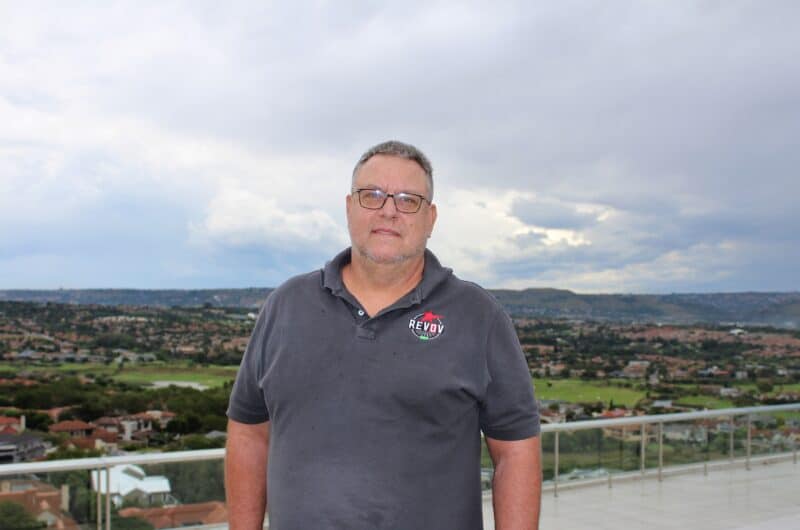Leading battery provider REVOV says high-voltage battery systems can help South African agriculture address energy insecurity, water shortages, and climate change.
REVOV is a South African energy storage solutions company that specialises in lithium-iron batteries, available as single units, all-in-ones, or powerful high-voltage systems. It was founded in 2016 by Lance Dickerson, a former Executive at MTN Group, and Felix von Bormann, a former engineering consultant for Sprint in the United States.
Agriculture is an important cog in the South African economy, with the Agricultural Business Chamber of South Africa revealing that it provided 920 000 jobs in the last quarter of 2023. Besides its important contribution to the country’s GDP, the sector is vital for food security, and it’s to this backdrop that agricultural businesses are investigating battery energy storage solutions (BESS), Lance says.

REVOV founder Lance Dickerson
The sustainability hat-trick
The agriculture sector faces a number of challenges, including energy insecurity caused by buckling infrastructure, water scarcity and climate change. High-voltage backup systems can address all three of those issues, Lance says.
“One of the more exciting use cases for BESS in the agriculture sector is in optimising irrigation. We are a water-scarce country, and irrigation can be optimised by high-voltage battery backup systems storing energy obtained from the grid or generated by solar panels during the day to be used during peak irrigation times, which reduces the reliance on generators and an unstable grid.
“Generators come with very high operating and maintenance costs irrespective of recent price cuts off the back of record highs, over and above the pollution, which is part of the problem regarding climate change,” he says.
A reliable source
Lance adds that electricity security is vital for farmers. “The Reserve Bank governor recently pointed out that the economy is on an uptick due to a long period of no load shedding. However, farms in rural areas not being supported with reliable grid infrastructure is still a serious issue.”
Crumbling or insufficient infrastructure is prone to a variety of faults. When there are outages, the lead time to getting them repaired is sometimes far too long, which reduces the viability of the sector. “When designed properly, BESS can provide a reliable backup source during outages which ensures continuity of critical farm operations, without belching diesel fumes from generators into the atmosphere,” he says.
Load shaving
Farms, like other businesses, are sensitive to input costs. Farms can only absorb so much, and eventually the increased costs need to be passed down the supply chain. Ultimately, the end consumer ends up paying more for essential food items. Lance says in all his interactions with stakeholders in the agriculture sector, finding cost savings is crucial.
“We are talking about the cost of diesel, maintenance, and – of course – electricity. Farms have the opportunity to utilise peak load shaving to save money,” he says.
“With well-designed systems, farms can manage their energy consumption by switching to battery power, or supplementing it with battery power, during times with peak electricity tariffs. This has two benefits. The first is that the farm can charge the batteries from the grid during low-tariff times, or through solar panels during the day. This saves significant money and can pay off the investment in a BESS installation surprisingly quickly. The other is that it reduces the total demand on the unstable grid, which also has a knock-on effect on power security in the area.”
Case study
REVOV, known for its premium 2nd LiFe lithium iron phosphate batteries and state-of-the-art BESS installations, is increasingly engaging with manufacturing, mining, retail and property businesses. Lance believes the wine industry is also poised to benefit from high-voltage battery systems.
“Wine farms often face challenges related to energy reliability and cost. These farms are typically located in rural areas where power outages can disrupt critical operations such as irrigation, refrigeration, and processing. Additionally, energy costs can be high, especially during peak demand periods,” he says. “Integrating a Battery Energy Storage System (BESS) can address these issues by providing a reliable backup power source and optimising energy use.”
“Energy usage is optimised by reducing the peak energy consumed and reducing the tariff charged. It also assists by enabling peaks to be carried by battery or solar instead of a generator which switches in when needed, at an enormous cost.”
Lance offers a hypothetical example of a BESS installation on wine farms:
Location: Stellenbosch, South Africa
Size: 100 hectares
Energy Sources: Grid electricity, solar panels
Challenges
- Frequent power outages: The farm experiences frequent power outages, especially during the harvest season, which can affect the quality of the wine.
- High energy costs: Energy costs are high due to peak demand charges and the need for continuous refrigeration. Continuous tariff increases (historically and planned) make solar and BESS combinations affordable and sometimes cheaper than grid power.
- Renewable energy utilisation: The farm has solar panels but struggles to utilise the generated energy fully due to variability in sunlight.
- Expansion of max energy available: Limits in terms of capacity supplied and long lead times to upgrade.
Solution: Implementing BESS
System Specifications:
- Battery Capacity: 500 kWh
- Inverter: 250 kW
- Integration: Connected to both the grid and the solar panel system
Implementation
- Energy storage: The BESS stores excess energy generated by the solar panels during the day.
- Peak shaving: During peak demand periods, the BESS discharges stored energy to reduce reliance on grid electricity, lowering energy costs.
- Backup power: In the event of a power outage, the BESS provides backup power to critical systems such as irrigation pumps and refrigeration units.
- Energy Management System (EMS): An EMS optimises the use of stored energy, ensuring that the BESS discharges energy when it is most cost-effective.
Pro-active remote monitoring and maintenance of system performance assures uptime and enables fault detection before it affects the customer, while an SLA ensures system longevity and consistent performance.
Benefits
By using stored energy during peak periods, the farm reduces its electricity bills. Peak shaving also helps lower demand charges imposed by the provider.
The BESS ensures that critical operations continue during power outages, protecting the quality of the wine. Continuous power supply also enhances the efficiency of irrigation and refrigeration systems.
In the process, the farm maximises its use of solar energy, reducing its carbon footprint. BESS integration aligns with a commitment to sustainable practices, leading to a measurable impact and a boost to the farm’s credibility with conscious consumers.
Finally, excess power produced once batteries are full could be fed back into the grid, yielding further savings or returns. The farm can also participate in demand response programmes, providing ancillary services to the grid and generating additional revenue.
Lance says that after implementing the BESS, clients can potentially enjoy a 20% reduction in energy costs and a significant improvement in operational reliability. “This use case demonstrates how BESS can substantially benefit wine farms, from cost savings and operational efficiency to environmental sustainability and new revenue streams.”













